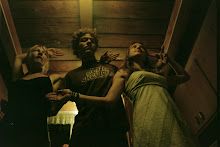Ever since I flipped through Bill Mollison's original
Permaculture I/II books, oggling the illustrations as if they were Penthouse fold-outs, the ideal of permaculture has captivated me. Granted, I have always been dubious about some of the more grandiose claims made by Mollison and others. The utopia of self-sufficient homesteads with perfect south-facing exposures sketched out in the
Permaculture books always seemed to hide the dirty realities of eco-pioneering.
Recently, I've been checking out the accounts of different self-proclaimed "permaculturists," attempting to set up eco-villages in Central America. Reading about their experiences has challenged me to re-think the concept of permaculture as a living movement. After all, permaculturists do adhere to a (now global) label, creating a community that seems to share distinct characteristics (I'd insert a jab about dirty hippies, but I'd be an armpit-hypocrite).
A topic for further inquiry: how can we understand the permaculture movement in the context of globalization? It was very gratifying to read the account of a family of California transplants establishing an eco-village in Costa Rica. Clearly, these were people who had put their environmental/social beliefs into practice, constructing a physical manifestation of their ideals. However, these are still Western people bringing what are presumably Western concepts to a very different, "Other" place. What distinguishes them from a California conglomerate or Western media?
Obviously my questions are blunt. They ignore the subtleties that truly define this situation. Nonetheless, it's a realm of inquiry I'd like to delve deeper into.
Haiti Aid: Perma-aid or Perma-imperialism?
Costa Rica Settlers: Green Globalization?


